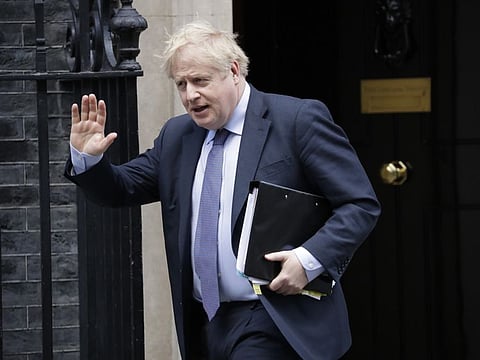Britain’s Boris bolsters power as storm clouds gather overseas
British premier’s good fortune may not last long as foreign policy agenda faces problems

Boris Johnson has postponed his planned forthcoming trip to see Donald Trump in the midst of UK-US policy spats from Huawei to digital taxes. With Johnson fighting on several foreign fronts, including Brexit, he is therefore consolidating his power at home after December’s landmark election.
Indeed, the last two weeks, which saw several big domestic policy announcements, have been the most important in UK politics since mid-December’s Conservative victory.
And Johnson may now enjoy greater power today as prime minister than any of his predecessors since at least Margaret Thatcher, with his ambitions to be in Downing Street for much of the 2020s.
Johnson likely to be at the height of his powers
With the largest Tory majority in the House of Commons since Thatcher in the late 1980s, Johnson is likely to now be at the height of his powers. Unlike Tony Blair, for instance, there is no obvious big counterweight to him in government like a Gordon Brown figure so he dominates the political scene, for the immediate future at least.
The latest step in Johnson’s consolidation of power came earlier this month when he dealt a major ministerial reshuffle. This was billed as promoting the next generation of talent.
However, it is no coincidence that cabinet ministers sacked, including Business Secretary Andrea Leadsom and Northern Ireland Secretary Julian Smith, tended to the ones who have shown most independence from Johnson.
Sajid Javid's shock departure
Moreover, the shock departure of Sajid Javid as chancellor came after he refused Johnson’s request to exert more control over him by firing all his special advisers. Javid is replaced as chancellor by another ex-banker — 39-year-old Rishi Sunak who only entered the House of Commons in 2015, and just a year ago was the most junior minister in the Housing, Communities and Local Government Department.
Accompanying the changes in government personnel, the prime minister has begun to map out a multi-year governing agenda, including with his “infrastructure revolution” to “level-up” the economy across England with the Tories having won in December a significant number of previous long-standing Labour strongholds in the Midlands and North.
This agenda includes construction of a high-speed train line from London to Birmingham, which could cost over £100 billion, and ultimately be extended into North England.
The ten months period from March to December inclusive is not likely, however, to be nearly long enough to agree more than what Chief EU negotiator Michel Barnier has called a “bare bones” UK-EU trade agreement. Yet, few in London nor Brussels have so far talked openly about the need for a transition extensionAndrew Hammond
Sunak’s first budget as chancellor is expected on March 11 (although this could now be postponed following the dramatic departure of Javid from The Treasury). Whenever it comes, the budget is likely to double-down on the theme of the infrastructure revolution with Johnson proposing the largest increase in day-to-day public spending in this Parliament, compared to the last one, in relative terms of any Tory prime minister since the late 1950s and early 1960s.
At the same time that Johnson is consolidating his power within the government, Shadow Cabinet Minister Keir Starmer has emerged as the early favourite to become the next Labour supremo and leader of the opposition, replacing Jeremy Corbyn. Starmer is seeking to play a ‘safety first’ campaign and has made a series of key pledges to try to win over internal support from the left of the party.
On the economic front, he has proposed increases in income tax for the top 5 per cent of earners, reversing the Tory cuts in corporation tax and clamping down in corporate tax avoidance; plus proposed nationalisation of rail, mail, energy and water. A standout foreign policy measure is his proposed introduction of a ‘Prevention of Military Intervention Act’ to put “human rights at the heart of foreign policy” and reviewing all UK arms sales to make the nation “a force for international peace and justice”.
In terms of devolution from Whitehall, he wants regional investment banks and stronger control over regional industrial strategy. He also favours abolishing the House of Lords and creating an elected chamber of regions and nations.
Labour leadership battle
However, while Starmer is the early favourite, he is by no means guaranteed of success in the face of challenges from Corbyn’s preferred successor, Rebecca Long-Bailey, while the ‘wild card’ contender is Lisa Nandy who is the only candidate not in the shadow cabinet.
The election will not be decided until April meaning that much of Labour’s attention will be focused internally for several weeks to come.
While Johnson consolidates power at home, it is not just the relationship with the United States where storm clouds are gathering. Negotiations, for instance, will commence next month on a potential EU-UK trade deal.
The ten months period from March to December inclusive is not likely, however, to be nearly long enough to agree more than what Chief EU negotiator Michel Barnier has called a “bare bones” UK-EU trade agreement. Yet, few in London nor Brussels have so far talked openly about the need for a transition extension, threatening what even Nigel Farage has called the likelihood of a new Brexit crisis by the Summer at which time both sides need to decide if there will be an extended transition period into 2021
This underlines that problems are brewing for the prime minister on the foreign policy front that could yet see his agenda stymied. While he seems politically impregnable, for now, his good fortune will not last indefinitely.
— Andrew Hammond is an Associate at LSE IDEAS at the London School of Economics.



